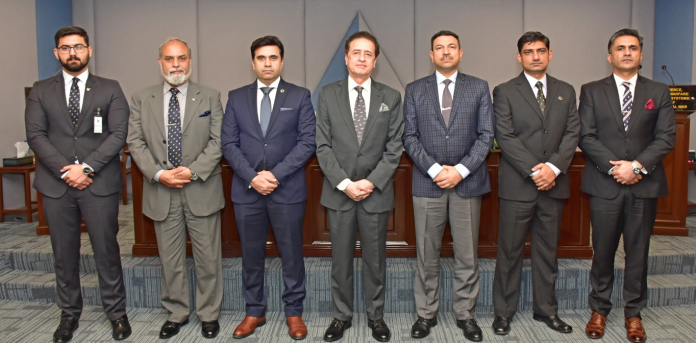LAHORE, JULY 18 (DNA):The Centre for Aerospace and Security Studies (CASS), Lahore, hosted a seminar titled “Artificial Intelligence, Electronic Warfare & Cyber Warfare, and Unmanned Aerial Systems: A New Paradigm of Next-Generation Aerial War” on 17 July 2025. The event was widely attended by academics, students, intellectuals, and domain experts. In his introductory remarks, Air Commodore (Retd) Dr Naveed Khaliq Ansaree, Director – CASS Lahore, noted that advancements in emerging technologies mark a seismic shift in the character of warfare. Their impact, he stressed, is critical to the future operational readiness and strategic posture of the Pakistan Air Force.
Prof Dr Yasser Ayaz, Chairman of the National Centre of Artificial Intelligence (NCAI), while delivering the keynote address, stated that Artificial Intelligence (AI) will bring a transformational change and represents the biggest revolution in military affairs since the advent of gunpowder and nuclear weapons. He added that air forces have the greatest scope for AI application, particularly in refining the OODA loop and enhancing command centres. Citing the United States’ Joint All-Domain Command and Control (JADC2) system, he emphasised the need for armed forces to adopt a unified, cross-domain approach to AI. Group Captain Farhan Ahmed, expert on Cyber operations, noted that warfare has evolved from platform-versus-platform to systems-versus-systems, with cyber serving as a critical enabler of network-centric operations. He stressed that integration of sensors, shooters, and decision-makers is essential for modern warfare, and that the Pakistan Air Force has already integrated around 25,000 assets under the ambit of cyber security. While discussing Operation Zarb-e-Karar, he mentioned that the PAF cyber force targeted 100 adversarial organisations with 4,400 ICT elements, achieving an ICT destruction score of 67–0. This resulted in physical ramifications, including disruption in the energy, transport, and communication sectors. Air Commodore (Retd) Raza Haider, Director CASS – Islamabad, observed that in fifth-generation warfare, the state that masters cutting-edge technologies inevitably commands greater economic and military power. He warned that the world is drifting towards a “tech-polar” order, with countries such as Pakistan, Türkiye, and Iran striving for full technological sovereignty, particularly in drone and electronic warfare, to reduce strategic dependence.
In his concluding remarks, Air Marshal Asim Suleiman, President of CASS Lahore, stated that modern conflict has transitioned from visible destruction to silent disruption. Three imperatives have emerged: technological sovereignty through indigenous systems, cross-domain jointness for synchronised response, and agility to adapt in real time. He added that Operation Zarb-e-Karar signalled Pakistan’s resolve to shape and secure the digital battlespace of the future through multi-domain operations. Spearheaded by Air Chief Marshal Zaheer Ahmed Babar Sidhu, the operation demonstrated seamless integration of artificial intelligence, cyber and electronic warfare systems, and unmanned aerial platforms. Through pinpoint UAV strikes, strategic electronic disruption of enemy radars, and cyber-attacks that crippled the Indian Air Force’s air tasking cycle, Pakistan showcased not only operational precision but cognitive dominance. The war highlighted the power of systems over firepower, where speed, resilience, and intelligent decision-making now define victory. The interactive session emphasised the imperative of tri-service synergy to harness AI, cyber-electronic warfare, and unmanned systems for effective execution of multi-domain operations.

















